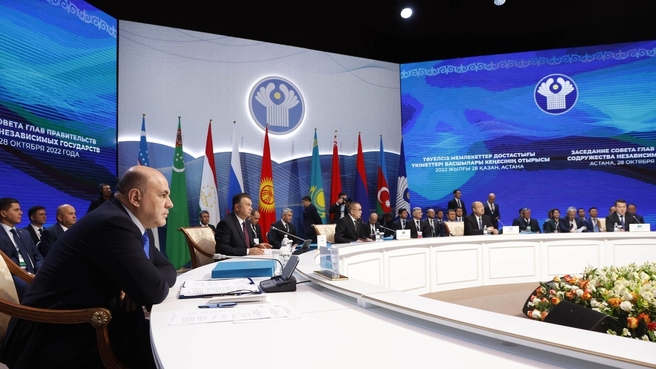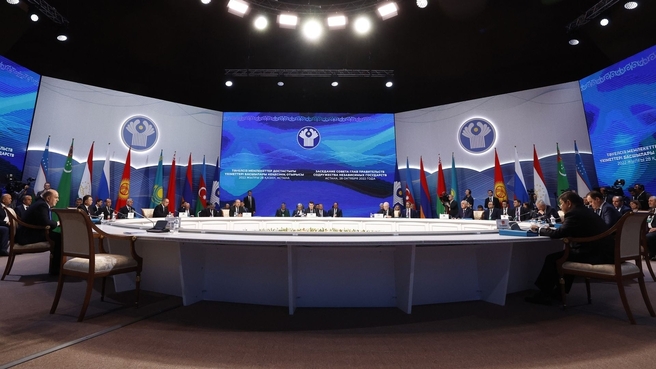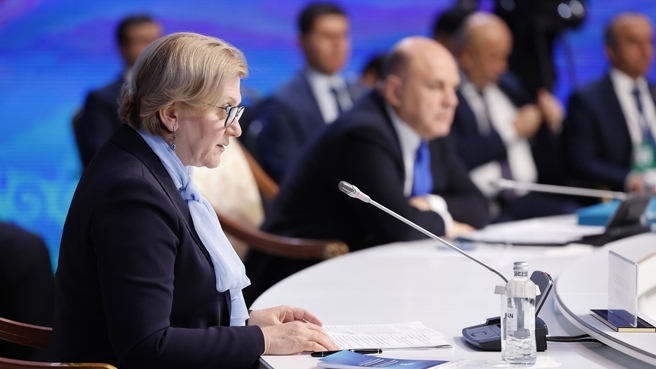List of heads of delegations of the CIS member states:
Expanded meeting of the Commonwealth of Independent States Council of Heads of Government
Prime Minister of the Republic of Azerbaijan Ali Hidayat oglu Asadov;
Deputy Prime Minister of the Republic of Armenia Mher Grigoryan;
Prime Minister of the Republic of Belarus Roman Golovchenko;
Prime Minister of the Republic of Kazakhstan and Chairman of the CIS Council of Heads of Government Alikhan Smailov;
Prime Minister and Chief of Staff of the Presidential Executive Office of the Republic of Kyrgyzstan Akylbek Japarov;
Prime Minister of the Russian Federation Mikhail Mishustin;
Prime Minister of the Republic of Tajikistan Kohir Rasulzoda;
Deputy Prime Minister of the Republic of Turkmenistan Hojamyrat Geldimyradov;
Prime Minister of the Republic of Uzbekistan Abdulla Aripov;
Chairman of the Executive Committee and Executive Secretary of the Commonwealth of Independent States Sergei Lebedev.
Message from Anna Popova, Head of the Federal Service for the Oversight of Consumer Protection and Welfare (Rospotrebnadzor)
Excerpts from the transcript:
Anna Popova: Mr Smailov, Mr Mishustin, heads of delegations,
The CIS agreement on cooperation in preventing and responding to sanitary and epidemiological emergencies strengthens the legal foundation for developing a collective system to counter biological threats in the region. It creates new opportunities for interaction, helping to prevent the cross-border spread of infections without declaring lockdowns or restrictions on the movement of people and trade.
Our countries have a major advantage: powerful sanitary and epidemiological services, science and the personnel training system, which was formed back in the Soviet era and is actively developing now. Our experts speak the same language. Our sanitary and epidemiological services have established cooperation, which proved to be effective during the pandemic.
A lot has already been done to form a common epidemiological space of the CIS member countries. We do not have to start from scratch. For more than 10 years, our countries have been taking measures to form a common system for preventing and responding to sanitary and epidemiological emergencies. We created a network for monitoring infectious threats, which includes 15 specialised institutions in eight countries and 19 mobile laboratories in six CIS states.
A basic organisation to respond to outbreaks of dangerous infections in the CIS is operating at the Rospotrebnadzor Microbe Research Institute in Saratov.
Nineteen programmes to provide assistance to the CIS countries have been implemented with the support of the Russian Government. Today, seven joint projects are underway: the measles elimination programme; efforts to combat the threat of the spread of plague from transboundary foci; implementing international health regulations; strengthening laboratory networks, including mobile laboratories; fighting against HIV/AIDS and hepatitis; countering the spread of antimicrobial-resistant microorganisms; and studying population immunity to Covid-19 and sequencing coronavirus strains.
The total 10-year investment for these goals exceeds four billion roubles and $200 million.
More than 2,000 units of equipment have been delivered to dozens of laboratories; more than 5,000 specialists have been trained; and several million doses of vaccines against measles, hepatitis and Covid-19 and over 10 million tests for diagnosing infections have been donated.
In particular, as a result of the programmes, a training centre for combating infectious diseases has been created in Armenia this year, and a system for the early diagnosis of the HIV infection in children has been introduced in Kyrgyzstan.
In just five years, over 20 joint expeditions were held to examine the natural foci of dangerous infections in Armenia, Belarus, Kazakhstan, Kyrgyzstan, Tajikistan and Uzbekistan.
Thanks to our joint work, we are able to ensure epidemiological well-being with regard to many infections in the CIS countries in general. In particular, our countries managed to maintain low incidence during a surge of measles cases in Europe in 2014–2017. We prevented the import and spread of wild poliomyelitis virus, despite the high risks in several countries, achieved a decrease in the incidence of HIV and hepatitis, and prevented the cross-border spread of dangerous infections from natural foci.
Thanks to a joint programme financed by Russia, we have managed to ensure a good situation with regard to plague on the territory of 45 natural plague foci in the CIS countries with a total area of more than two million sq km, despite cases in the neighbouring countries of Mongolia and China.
In 2021, we launched two new projects with Belarus, Kyrgyzstan, Tajikistan and Armenia to determine the level of population immunity to the novel coronavirus infection. Four stages of this study have already been carried out with several countries.
We are carrying out joint exercises with Armenia, Kyrgyzstan and Belarus, and are studying variations in the strains of the novel coronavirus in these countries. Thanks to this, we can see the overall picture both in terms of herd immunity, which makes it possible for us to plan epidemic countermeasures, and in terms of coronavirus strains on this territory.
Infrastructure for responding to outbreaks of dangerous infections is an important element of the common epidemiological space, which we are also developing together. Mobile laboratories are an effective tool. There are 19 mobile laboratories deployed in GAZ vehicles and six laboratories in Kamaz lorries operating in six countries. They were transferred by Russia over the past five years and proved useful during the pandemic, providing diagnostics both in large cities and in remote areas.
In June-September of this year, a series of joint international training exercises on biosecurity and rapid response were held in Armenia, Belarus, Kazakhstan and Kyrgyzstan, with mobile laboratories operating in these countries.
In October, Saratov hosted drills on promptly responding to sanitary and epidemiological emergencies, in which more than 100 specialists from seven CIS countries took part.
The current controlled sanitary and epidemiological situation in the CIS countries is the result of joint work. It is important to continue forming the common system for preventing and responding to sanitary and epidemiological emergencies.
The agreement proposed today is aimed at creating a unified powerful “sanitary shield.” The document seeks to build strong and independent infrastructure, primarily laboratories, research centres, sanitary-quarantine checkpoints operating in a single coordinate system, and highly qualified personnel with practical experience in dealing with dangerous infections, as well as joint research and development.
We would like to thank our colleagues for their careful joint work, which made it possible to promptly prepare an up-to-date, well-considered and agreed-upon document. The agreement also considers the countries’ experience and approaches developed during the Covid-19 pandemic and will allow us to promptly counter biological threats.
I would like to ask the council members to support this proposal and sign the agreement.
Documents signed following the expanded meeting of the CIS Council of Heads of Government:
– Decision of the CIS Heads of Government Council on the Agreement on Free Trade in Services and on the Establishment, Activities and Implementation of Investment.
– CIS Agreement on Cooperation in Prevention and Response to Public Health Emergencies of a Sanitary and Epidemiological Nature.
– Decision of the CIS Heads of Government Council on the Concept of Scientific, Technical and Technological Cooperation of the CIS Member States and the Action Plan for its implementation.
– Decision of the CIS Heads of Government Council on the Concept of the Digital Transformation of the Chemical Industries in the CIS Member States and the Plan of Priority Actions for its Implementation.
– Decision of the CIS Heads of Government Council on the CIS Interstate Radio Navigation Programme for 2023-2026.
– Decision of the CIS Heads of Government Council on the Interstate Targeted Programme on the Reclamation of Land Exposed to Uranium Production in the CIS Member States.
– Decision of the CIS Heads of Government Council on the Regulation on the Accreditation Procedure and Conditions for the Participation of Legal Entities and Individuals in the CIS Interstate Programme of Innovative Cooperation up to 2030.
– Decision of the CIS Heads of Government Council on the Action Plan for holding the Year of the Russian Language as a Language of Interethnic Communication in the Commonwealth of Independent States in 2023.
– Decision of the CIS Heads of Government Council on the Plan of Priority Actions in Humanitarian Cooperation of the CIS Member States for 2023-2024.
– Decision of the CIS Heads of Government Council on the Joint Action Plan of the CIS Member States to counter antimicrobial resistance.
– Decision of the CIS Heads of Government Council on the Regulation on the Operator of the Interstate Programme of Innovative Cooperation of the CIS Member States for the period until 2030.
– Decision of the CIS Heads of Government Council on the execution of the unified budget of the CIS bodies for 2021 and certain aspects of funding the CIS bodies in 2022 and 2023.
– Decision of the CIS Heads of Government Council on the unified budget of the CIS bodies for 2023.
– Decision of the CIS Heads of Government Council on the use of allocations for the creation and development of a unified air defence system of the CIS member states and ensuring the activities of the Coordination Committee for Air Defence at the Council of the CIS Defence Ministers in 2021.
- Decision of the CIS Heads of Government Council on the allocation of funds for the creation and development of a unified air defence system of the CIS member states in 2023.
– Decision of the CIS Heads of Government Council on financing, in 2023, efforts to implement the Interstate Programme to Improve the Quality of Life for War Veterans - Participants of Local Conflicts and their Families in the CIS Member States for 2021-2025.
– Protocol Decision of the CIS Heads of Government Council on holding the 2nd CIS Games in the Republic of Belarus in 2023.















